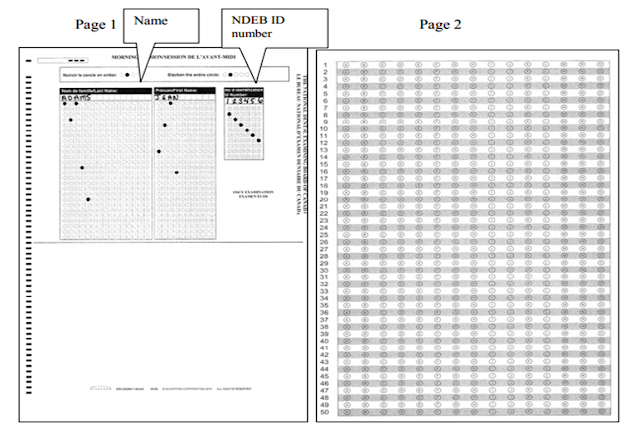The
National Dental Examining Board of Canada
Le
Bureau National d’Examen Dentaire du Canada
OBJECTIVE
STRUCTURED CLINICAL EXAMINATION
2013
PROTOCOL
The National
Dental Examining Board of Canada
Le Bureau
National d’Examen Dentaire du Canada
T A B L E O F C
O N T E N T S
CONTENT AND
FORMAT
............................................................................................................1
SCHEDULE
.....................................................................................................................................1
VALIDATION OF
REGISTRATION.............................................................................................2
INSTRUCTIONS
.............................................................................................................................2
SAMPLE QUESTIONS
...................................................................................................................5
SCORING
........................................................................................................................................9
REFERENCE TEXTS
...................................................................................................................11
EXAMINATION
REGULATIONS ..............................................................................................11
PASSING STANDARD
................................................................................................................13
RESULTS
......................................................................................................................................13
REPEATS
......................................................................................................................................13
Page 1
OBJECTIVE STRUCTURED CLINICAL EXAMINATION (OSCE)
2013
I CONTENT AND FORMAT
The OSCE is a
station type examination comprised of a morning session and an afternoon
session on the same
day.
The majority of the
stations will have 2 questions and will require the candidate to review the
information
supplied (e.g. case history, dental charts, photographs, radiographs, casts,
models)
and answer extended
match type questions. Each extended match type question will have up to
15 answer options
and one or more correct answers. All answers for these questions must be
recorded on the
answer score sheet provided.
A few stations may
require the candidate to review the information supplied and write an
acceptable
prescription for a medication commonly prescribed by general dentists in
Canada.
Any required
prescription must be legibly written on the supplied form and submitted as
directed. The
candidate’s NDEB Identification Number must be correctly recorded on the
prescription form.
Candidates will
have 5 minutes at each station to answer the questions. After 5 minutes the
candidate will move
to the next station. The Question and Answer Framework for the
examination is
available at http://www.ndeb.ca/accredited/osce-examination
The list of
competencies from which examination items are developed is available at
http://www.ndeb.ca/accredited/competencies
II SCHEDULE
Validation of
Registration 8:30 am
Morning Examination
Session 9:00 am to 11:30 am
Afternoon
Examination Session 1:30 pm to 4:15 pm Page 2
III
VALIDATION OF REGISTRATION
During the
validation of registration candidates will be issued an Identification (ID)
card. To
receive the ID
card, candidates will be required to show current government photo
identification,
(i.e. a current
passport or driver’s licence), for comparison to the ID card. Candidates who do
not provide
government photo identification will not be admitted.
Candidates must
have the ID card visible at all times and must return the card to the Test
Administrator at
the end of each session of the examination. The back of the ID card may be
used for
calculation or rough notes. Candidates must take the ID card with them from
station to
station during the
examination and submit it at the end of each session. Removing any paper
with copied test
items or notes from the examination location is prohibited and will be
considered as
compromising the integrity of the examination. The consequences of such actions
are delineated in
NDEB By-law 20.01. The NDEB will verify that all ID cards are returned.
Candidates who fail
to return the ID card may receive a zero (“0”) score for the examination.
IV INSTRUCTIONS
1. Enter your NAME
and your assigned ID number in the indicated areas on the answer score
sheet.
2. Each question is
followed by a choice of answers. Record your answer(s) on the answer
score sheet using a
standard (wood) lead pencil (No. 2 or HB) only. No other writing
devices (e.g.
mechanical pencils; pens or felt-type markers) are allowed in the examination
area. When entering
answers make heavy black marks that completely fill the appropriate
circle(s).
3. If you change
your answer, make sure that the original mark is thoroughly erased. Use a
standard block
eraser. Mechanical erasers are not allowed.
4. Make no stray
marks on the answer score sheet.
5. Ensure that you
record your answer(s) in the correct place opposite the correct question
number.
6. Any candidate
writing on, or marking examination material, other than the score sheet and
the ID card will be
dismissed from the examination and will be given a zero (“0”) score for
the examination.
7. Candidates may
use magnification aids such as magnifying glasses or loupes.
8. Note that when
viewing prints of the radiographs, you are facing the patient.
9. The transfer of
answers to the computer score sheet MUST be completed within the session
time. Additional
time will not be allowed.
10. The answer
score sheet and ID card must be returned at the end of the session. If all or
part
of any of these is
not returned, a zero (0) score will be given.number
11. The FDI two-digit tooth numbering system (below) is used
in all examinations.
FOR MORE DETAIL OF THIS ARTICLE CLICK HERE







No comments:
Post a Comment